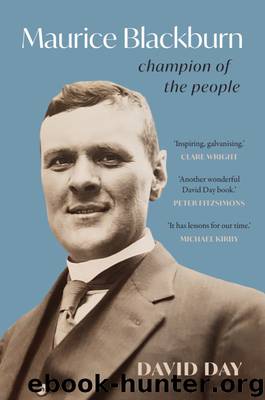Maurice Blackburn by David Day

Author:David Day
Language: eng
Format: epub
Tags: HIS054000, BIO006000, BIO010000, LAW060000, HIS004000
Publisher: Scribe Publications Pty Ltd
Published: 2019-11-18T16:00:00+00:00
Chapter 14
The Blackburn Declaration
1920–1924
‘a scrupulously honourable man’
After the war, Australia was slow to return to a semblance of normality. The four ruinous years had cut a wide swathe through the ranks of the country’s menfolk, killing 60,000 and leaving many more broken in body and mind, while the subsequent influenza pandemic killed another 12,000. One family of eleven children had two sons return safely from the war, only to have nine of their children die during the pandemic.1 Politically, the country still exhibited the deep scars of the war and had a narrower view of what it took to be Australian. Being European had once been sufficient, but it was now necessary to be British. With Prime Minister Hughes lauding Australians as ‘more British than the people of Great Britain’, this became the new and stultifying sense of Australian identity.2 Even that narrowly defined British identity was far from a unified one, with the deep sectarian divisions between Protestants and Catholics being exacerbated by the Easter Uprising in Dublin and the conscription debates. Although sectarianism would bedevil the nation for decades to come, Maurice had no truck with it.
During the three campaigns for the Essendon seat, Maurice was caught between a Catholic Federation that wanted state assistance for Catholic schools and the Protestants who were demanding Bible classes in state schools. He’d tried to chart a careful course between both sides, which was not easy in a city where Protestants and Catholics regularly paraded through the streets and sometimes came to blows over ancient quarrels. Maurice abhorred such behaviour, which was partly why he’d helped to establish the Free Religious Fellowship, which welcomed people of all religions or of none.3 Maurice believed that sectarianism should have no place in Australia, arguing that it was a dangerous distraction designed to cause disunity among the working class. Moreover, the questions the sectarian groups were fighting over ‘can never be solved on this side of the grave’. Just as the wealthy of both religious traditions united to protect their material interests, so ‘the poor of all creeds must stand together’.4 Only then could they achieve their political advancement. It was an argument that Maurice had often made. In a letter to the Catholic Advocate, he had bemoaned the actions of some French socialists who’d attacked the church. The workers’ bellies, wrote Maurice, ‘have never been filled by priest-eating’.5 But how was class unity going to be achieved in the wake of a war that had devastated and divided the nation, left the Labor Party tainted by charges of disloyalty, and seen Hughes incorporate militarism and Anzac commemoration as a central part of the postwar Australian identity?
For its part, the Labor Party emerged from the bruising experience of the war with an unwavering commitment to peace and internationalism. The bitter anti-conscription fights helped to cement such views within the party’s platform and program.6 The influence of former activists from the Victorian Socialist Party also ensured that Labor was more radical than it might otherwise have been.
Download
This site does not store any files on its server. We only index and link to content provided by other sites. Please contact the content providers to delete copyright contents if any and email us, we'll remove relevant links or contents immediately.
2010-The City & the City by China Miéville(1993)
Anatomy of Injustice by Raymond Bonner(1668)
That Every Man Be Armed by Stephen P. Halbrook(1583)
ADHD on Trial by Michael Gordon(1578)
Injustices by Ian Millhiser(1501)
You Don't Own Me by Orly Lobel(1447)
Tell by Major Margaret Witt(1445)
Course Correction by Ginny Gilder(1412)
Broken Scales by Joel Cohen(1353)
Without Copyrights by Spoo Robert(1349)
A Vast Conspiracy by Jeffrey Toobin(1331)
First by Evan Thomas(1291)
J by Howard Jacobson(1262)
A Religious Orgy in Tennessee by H.L. Mencken(1256)
The Run of His Life: The People v. O. J. Simpson by Jeffrey Toobin(1216)
A Triumph of Genius: Edwin Land, Polaroid, and the Kodak Patent War by Ronald K. Fierstein(1205)
A History Of Thailand by Baker Chris(1198)
John Wayne Gacy by Judge Sam Amirante(1115)
Law 101: Everything You Need to Know About American Law, Fourth Edition by Jay Feinman(1105)
